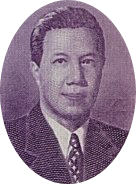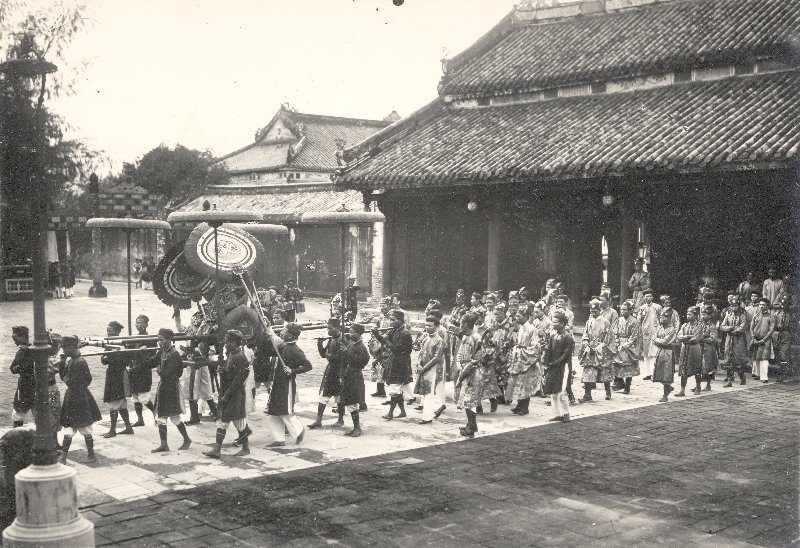<Back to Index>
- Biochemist Charles Glen King, 1896
- Writer Ivan Alekseyevich Bunin, 1870
- Emperor of Vietnam Bảo Ɖại, 1913
PAGE SPONSOR


Bảo Đại (Hán tự: 保大, lit. "keeper of greatness", 22 October 1913 – 30 July 1997), born Nguyễn Phúc Vĩnh Thụy (阮福永瑞), was the 13th and last ruler of the Nguyễn Dynasty. From 1926 to 1945, he served as emperor of Annam under French 'protection'. During this period Annam was a protectorate within French Indochina. Annam today covers the central two-thirds of Vietnam (Contemporary Vietnam being a merger of Annam & the former French Indochina provinces of 'Tonkin' to the north & 'Cochinchina' in the south). Bảo Đại ascended the throne in 1932 at the age of 19. The Japanese ousted the French in March 1941 and then ruled through Bảo Đại. At this time, Bảo Đại renamed his country "Vietnam". He abdicated in August 1945 when Japan surrendered. He was chief of state of the State of Vietnam (South Vietnam) from 1949 until 1955. Bảo Đại was criticized as being closely associated with France and spending much of his time outside of Vietnam. Prime Minister Ngô Đình Diệm ousted him in a referendum held in 1955.
Bảo Đại was born Prince Nguyễn Phúc Vĩnh Thụy in the Palace of Doan-Trang-Vien, part of the compound of the Purple Forbidden City in Huế, the capital of Annam, as Vietnam was then called. He later was given the name Nguyễn Vĩnh Thụy. His father was King Khải Định of
Annam. His mother was the king's second wife, Tu Cung, who was renamed
Doan Huy upon her 1913 marriage. She held various titles over the years
that indicated her advancing rank as a favored consort until she
eventually became Empress Dowager in 1933, with style of Her Imperial
Majesty being added in 1945.
Vietnam had been ruled from Huế by the Nguyễn dynasty since 1802. The French government, which took control of the region in the late 19th century, split Vietnam into three areas: the protectorates of Annam and Tonkin and the colony of Cochinchina. The Nguyễn Dynasty was given nominal rule of Annam.
At the age of nine, Prince Nguyễn Phúc Vĩnh Thụy was sent to France to be educated at the Lycée Condorcet and, later, the Paris Institute of Political Studies. In 1926, at age 13, he became king following his father's death and took the name Bảo Đại.
He did not ascend to the throne due to his age and returned to France
to continue his studies. He was subject to control by the French of his government, Annam at that time being part of the Union of French Indochina. Throughout the 20th century, Bảo Đại was widely perceived to be a puppet ruler for French colonial interests. On
20 March 1934, at the imperial city of Huế, Bảo Đại married
Marie-Thérèse Nguyễn Hữu Thị Lan (a.k.a Mariette,
1914 – 1963), a commoner from a wealthy Vietnamese Catholic family. She
was renamed Nam Phương (Southern Scent). The couple had five children. She was granted the title of empress in 1945. Bảo Đại had four other wives, three of whom he wed during his marriage to Nam Phương. One of his concubines was a dancer from Hanoi, Ly Le Hang. In 1940, during the second World War, coinciding with their ally Germany's invasion of France, the Japanese invaded French Indochina. While they did not eject the French colonial administration, the occupation authorities directed policy from behind the scenes in a parallel of Vichy France. The Japanese promised not to interfere with the court at Huế, but in 1945, after ousting the French, coerced Bảo Đại into declaring Vietnamese independence from France as a member of Japan's "Greater East Asia Co-Prosperity Sphere"; the country then became the Empire of Vietnam. The Japanese had a Vietnamese pretender, Prince Cường Để, waiting to take power in case the new emperor's "elimination" was required. Japan surrendered to the Allies in August 1945, and the Vietminh under the leadership of Hồ Chí Minh aimed to take power in a free Vietnam. Due to his recent Japanese associations, Hồ was able to persuade Bảo Đại to abdicate on 25 August 1945, handing power over to the Vietminh — an event which
greatly enhanced Hồ's legitimacy in the eyes of the Vietnamese people.
Bảo Đại was appointed "supreme advisor" to Hồ's Democratic Republic of Vietnam in Hanoi, which asserted its independence on 2 September 1945, but was ousted by the French in November 1946. As Vietnam descended into armed conflict — rival factions clashed
with each other and also with the remaining French — Bảo Đại left Vietnam after a year in his "advisory" role, living in both Hong Kong and China. The French persuaded him to return in 1949 to serve as "head of state" (quốc trưởng),
not as "emperor" (Hoàng Đế). He soon returned to France,
however, and showed little interest in the affairs of his own country
when his own personal interests were not directly involved. The
victory of communism in China in 1949 led to a revival of the fortunes
of the Vietminh. The United States extended diplomatic recognition to
Bảo Đại's government in March 1950 soon after communist nations
recognized Hồ's government. The outbreak of the Korean War in
June led to U.S. military aid and active support of the French war
effort in Indochina, now seen as anti-communist rather than colonialist. But the war between the French colonial forces and the Việt Minh continued, ending in 1954 shortly after a major victory for the Việt Minh at the Battle of Điện Biên Phủ. The 1954 peace deal between the French and the Việt Minh, known as the Geneva Accords, involved a Chinese inspired, supposedly temporary partition of
the
country into "Northern" and "Southern" Vietnamese administrations. Bảo
Đại moved to Paris, France, but remained "Head of State" of South Vietnam, appointing the Roman Catholic nationalist, Ngô Đình Diệm, as his prime minister. However, in 1955, Diệm used a referendum to remove Bảo Đại and establish a republic with
Diệm as president. The referendum was widely regarded as fraudulent,
showing an alleged ninety-eight percent in favor of a republic. Bảo Đại
abdicated once again and remained in exile for the remainder of his life in Paris, France. In
1972, Bảo Đại issued a public statement from exile, appealing to the
Vietnamese people for national reconciliation, stating "The time has
come to put an end to the fratricidal war and to recover at last peace
and accord". Bảo Đại still held great influence among local political figures in the Quảng Trị and Thừa Thiên-Huế provinces and also in the city of Huế, the former imperial capital of Vietnam. The Communist government of North Vietnam sent
representatives
to France hoping that Bảo Đại would become a member of a coalition
government which might reunite Vietnam, in the hope of
attracting his supporters in the regions wherein he still held
influence. As a result of these meetings, Bảo Đại publicly spoke out
against the presence of American troops on the territory of South Vietnam, and he also criticized President Nguyễn Văn Thiệu's regime in South Vietnam. He called for all political factions to create a free, neutral, peace loving government which would resolve the tense situation that had taken form in the country. In 1982, Bảo Đại, his wife, Vĩnh Thụy, and other members of the former imperial family of Vietnam visited the United States. His agenda was to oversee and bless Buddhist and Caodaiist religious ceremonies, in the Californian and Texan Vietnamese - American communities. While
in the United States, Emperor Bảo Đại gauged opinion among the exiled
Vietnamese - American community, hoping to find a route towards national
reconciliation. Bảo Đại died in a military hospital in Paris, France in 1997. He was interred in the Cimetière de Passy. After his death, his eldest son Crown Prince Bảo Long inherited the position of head of the Nguyễn Dynasty.
The last cash coin ever produced in the world bears the name of Bảo Đại in Chinese characters. There are three types of this coin. Large cast piece with 10 van
inscription on the reverse, medium cast piece with no reverse
inscription, and small struck piece. All were issued in 1933.